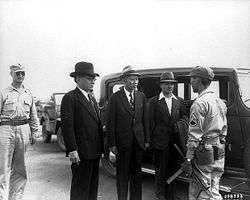José Laurel III
José Sotero "Pepe" Laurel III y Hidalgo,[1] (August 27, 1914 – January 6, 2003[2]) also known as José S. Laurel III, was the aide-de-camp of President Jose P. Laurel during the World War II period. He later became ambassador of the Philippines to Japan.

Early life
He was born on August 27, 1914. He mastered the Japanese language and culture in the Imperial Japanese Army Academy from 1934 to 1937.
In 1976, he initiated the Philippine Federation of Japan Alumni (PHILFEJA), a congregation of former students who graduated in Japanese colleges and universities including grantees of training programs. The association aims to strengthen Philippine-Japan relationship through educational and professional exchanges.
Personal life
He is the 2nd of 9 siblings. He is the son of José P. Laurel with his wife Pacencia Laurel and brother to Jose Jr., Salvador and Sotero Laurel II. He was married to Beatrice Laurel with children, including José Laurel V.
References
- Jose P. Laurel Memorial Foundation
- "Amb. Jose Sotero Laurel III Contributes Professorial Chair in Agribusiness". University of the Philippines Los Baños. 20 November 2014. Archived from the original on 2017-03-06. Retrieved 19 November 2016.
- Ventura, Francesca Murphy. "Contemporary transitions: How developments in Philippines-Japan relations have shaped Japanese language education in the Philippines," paper presented at the 8th International Conference on Philippine Studies (ICOPHIL). Quezon City, Philippines. 23–26 July 2008.
- Study Japan Website: List of Associations
- PHILJEFA Online:About Us